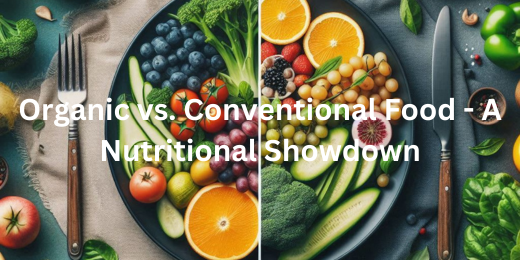
Organic vs. Conventional Food – A Nutritional Showdown
Organic vs. conventional food
The Basics of Organic Farming
Organic farming is based on sustainable practices that focus on improving soil health and biodiversity. It relies on natural fertilizers like compost and manure to enrich the soil, avoiding artificial chemicals. This method excludes genetically modified organisms, promoting a healthier ecosystem and reducing the environmental impact of farming practices.
The primary difference between organic vs conventional farming lies in their approach to pest control and fertilization. Organic farms use biological pest control methods, while conventional farms depend on chemical pesticides. A nutritional comparison of products from both methods reveals slight variations in vitamin content but generally comparable overall health benefits.
Choosing between organic vs conventional produce involves considering several factors, including cost and personal health preferences. Organic vs. conventional food debates often focus on the perceived safety and environmental concerns of each method. Consumers must weigh these aspects based on their values and priorities when selecting produce.
The Basics of Conventional Farming
Conventional farming practices focus on maximizing crop yield through the use of synthetic inputs. Farmers often rely on chemical fertilizers, pesticides, and herbicides to ensure productivity and control pests. Over time, these actions may contribute to a detrimental influence on ecosystems and the environment.
In organic vs conventional farming, conventional methods prioritize efficiency, sometimes compromising environmental sustainability. Organic vs. conventional food comparisons often highlight the health risks of synthetic chemicals used in conventional agriculture. However, conventional farming typically produces larger quantities, making food more affordable for consumers.
The choice between organic vs conventional produce depends on various factors such as environmental concerns and health benefits. A detailed nutritional comparison shows both types of produce can offer essential nutrients. The trade-off involves potential chemical exposure in conventional farming, which may influence consumer decision-making based on health priorities.
Nutritional Differences Between Organic and Conventional Produce
Several studies have examined the nutrient content differences between organic vs conventional produce across various categories. Research suggests organic fruits and vegetables may contain higher levels of vitamins and antioxidants. However, these variations depend on factors such as soil quality, crop variety, and the overall farming conditions during the growing process.
A detailed nutritional comparison shows that organic produce could offer more beneficial nutrients like vitamin C and iron. However, conventional produce is still considered nutritious and widely available in many regions. The potential for increased antioxidants in organic foods can be linked to the absence of synthetic chemicals.
Consumers often evaluate organic vs. conventional food choices based on nutritional content and overall quality. Although organic options may have higher nutrient levels, growing conditions play a crucial role in nutrient density. Ultimately, both farming methods offer valuable produce for healthy dietary consumption.
The Environmental Impact of Organic vs. Conventional Farming
Organic farming provides significant ecological benefits, such as reducing pesticide use and enhancing overall soil health. It also promotes biodiversity by fostering healthier ecosystems and protecting wildlife habitats. This method lowers the environmental impact compared to conventional farming, which often relies on chemical inputs harmful to natural ecosystems.
In contrast, conventional farming can cause detrimental effects, including water pollution and increased greenhouse gas emissions. The excessive use of synthetic fertilizers and pesticides contributes to long-term environmental degradation. When comparing organic vs conventional farming, organic methods are generally seen as more environmentally friendly due to sustainable practices.
Sustainable agriculture is essential to ensuring long-term environmental protection and food security. Consumers must evaluate organic vs conventional produce based on its ecological footprint and sustainability. Choosing organic methods supports practices that protect natural resources and reduce negative effects on the planet.
The Cost and Accessibility of Organic Produce
The cost of organic vs conventional food reflects the value of sustainable practices and health benefits. Organic farming ensures higher quality produce, justifying the price difference with better nutrition and environmental stewardship. The willingness of consumers to spend more for food that promotes both their own and the planet’s health is growing.
In South India, organic vs conventional produce is becoming more widely available, benefiting consumers across various regions. Organic food is now accessible in local markets, making it easier for different groups to make healthier choices. With growing demand, organic options are expanding in both urban and rural areas, enhancing availability.
Efforts to promote organic farming are making these products more affordable for consumers. Initiatives like community-supported agriculture and bulk purchasing help lower costs while boosting accessibility. Increasing availability through various channels allows more people to enjoy organic food and contributes to reducing the environmental impact of farming.
Choosing the Right Option: Organic or Conventional?
When choosing between organic vs conventional food, personal preferences and dietary needs play a crucial role in decision-making. Consumers may prioritise factors such as taste, health benefits, or affordability. Understanding individual needs helps in making informed choices that align with health goals and lifestyle preferences.
Incorporating both organic vs conventional produce can offer a balanced approach to nutrition and affordability. While organic products may provide additional nutrients, conventional foods are often more accessible. A balanced diet can benefit from the strengths of each type, offering variety and sustainability in daily eating habits.
Supporting organic vs conventional farming practices can promote a more sustainable and ethical food system. Choosing organic helps reduce the environmental impact, while conventional farming ensures food security on a larger scale. Consumers can contribute to positive change by making mindful decisions that support environmentally friendly farming practices.
For a diverse selection of high-quality Uyir organic food products and eco-friendly organic fertilizers, explore the nearest Uyir Organic Farmers Market or conveniently shop online at www.uyironline.in or www.uyirorganic.farm.